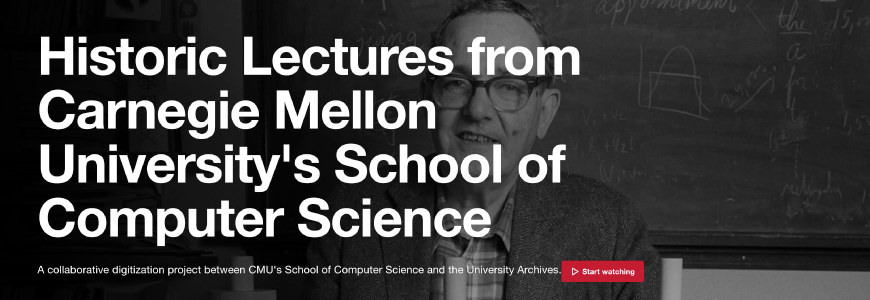
This spring the University Archives launched a new Vimeo channel to highlight and provide online access to some of the remarkable audiovisual holdings in our collections. Over the coming months we will continue to add newly and previously digitized content from the university's history. The new site will also be the future home of recordings from the CMU Oral History Program. In the meantime, here are a few highlights from a couple of recent projects that we are especially excited to share.
Early Promotional Films from CMU's Computer Science Department
C.mmp, The Carnegie Multi-Mini Processor (1976)
Between 1973 and 1977 the Computer Science Department at Carnegie Mellon University produced a series of six promotional and instructional films on various groundbreaking research topics such as C.mmp, a multiprocessor that was developed at CMU by William Wulf (see video above), and Chess as Problem Solving (CAPS), an early computer chess program written by Hans Berliner. The films were made by Ralph Guggenheim (DC 1974, S 1979), alumnus and co-founder of Pixar who at the time worked for the University's central marketing department, and Paul Newell, son of AI founder Allen Newell and who generously collaborated with the University Archives to digitize his original 16mm prints. You can watch three titles from this series on the University Archives Vimeo site.
Historic Lectures from CMU's School of Computer Science
Allen Newell, 'Desires and Diversions' from 1991
In 2017 the University Archives partnered with the School of Computer Science to preserve and digitize a collection of 400 videotapes. Recorded between 1970 and 1993, the tapes capture compelling lectures led by some of the pioneers of computer science including Herb Simon, Allen Newell, Raj Reddy, John Hopcroft, Gordon Bell, Alan Perlis, and Ivan Sutherland. The videos provide first-hand accounts of a scientific field being created—one that would eventually shape nearly every aspect of modern life.
Over the past few years, with the generous support of several donors, the University Archives has digitized 30 videos from the collection. Several of these are now available on the University Archives new Vimeo site , including Allen Newell's final public lecture, 'Desires and Diversions' (see the except above). This fall we will premier another batch from the collection including a lecture by Gordon Bell on computer architecture. For more background information on the Computer Science Videotape Collection and the University Archives' effort to digitize and preserve it, check out this recording of a webinar we did in June of 2020.
Construction of the Mellon Institute Building
The Mellon Institute Building (1966)
Have you ever stopped to ponder the giant building surrounded by columns that sits on the corner of 5th and Bellefield Avenues in Pittsburgh's Oakland neighborhood? This iconic building was the former home of the Mellon Institute of Industrial Research, an independent research firm dedicated to solving the immediate needs of industry and training new scientists. Throughout the Mellon Institute's tenure, its scientists made major discoveries including the first gas mask used in WWI and ethylene glycol, widely used in anti-freeze. In 1967, after 54 years operating as an independent research hub, the Mellon Institute merged with Carnegie Tech to form Carnegie Mellon University. In the short film, The Building of Mellon Institute, viewers are taken back to the 1930s - 90 years ago - when the iconic building was under construction. After watching, you may never look at the building the same way again.
- Emily Davis, Project Archivist
